Interviewed and Written by Patrick Mc Gavin 7/09
ROBERT SIGEL ’53
Every day of our lives, we make choices, shaped by feeling, intuition and habit. Some times it all flows and reaches a pure, inexorable logic and other times, it’s counterintuitive, going against the grain. Robert F. Sigel likes to say of himself: I’m a strange man.
against the grain. Robert F. Sigel likes to say of himself: I’m a strange man.
It is not just a surface observation. It cuts to the core of his sensibility and way of looking at the world. He comes at things from different angles, kind of a cosmic joke in the sense he also jokes about how poorly he used to perform on math. His life is interesting in the role of fate and happenstance.
Sixty years ago, in the winter of 1949, Mr. Sigel was a fourteen-year-old eighth grader at St. Catejan Grammar school trying to decide where he would enroll in high school. As the oldest of three children of Robert and Edith (Fitzgerald), he was the family trailblazer. His mother was a stickler for education. The family was devout, meaning there was no question the school of choice would be a Catholic institution.
The wild card was an almost unexplainable medical condition that dogged Mr. Sigel growing up. The family lived in the far southwest side Morgan Park area at 107th and Campbell. Bob experienced the equivalent of “panic attacks,” or “motion sickness,” if he was forced to travel long distances in claustrophobic conditions, like buses or streetcars.
Mr. Sigel picks up the story.
“Back then, you’d take the entrance exam to all the Catholic high schools to hedge your bet. It was a given we were going to a Catholic school. I got sick going twice on the streetcar going to St. Ignatius. Twice I had to get off the streetcar. My whole group of Catejan friends got off with me the first time at 55th Street at Garfield Boulevard. We stood at what they called ‘safety islands,’ that’s where you boarded the streetcars. We got off and I was able to get some breaths and recover.
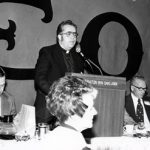 “After boarding another car, I got down to I think 18th Street and I was a goner again. In order for [my friends] to get to the test on time, they kept going. I did recover enough to get to Ignatius and the exam had started. The Jesuits were nice to me and they still let me take the test. I took it for Ignatius, but I thought to myself, four years of streetcars and [doing that commute] every day, I [just was not comfortable with that thought].
“After boarding another car, I got down to I think 18th Street and I was a goner again. In order for [my friends] to get to the test on time, they kept going. I did recover enough to get to Ignatius and the exam had started. The Jesuits were nice to me and they still let me take the test. I took it for Ignatius, but I thought to myself, four years of streetcars and [doing that commute] every day, I [just was not comfortable with that thought].
“I also took the test for Mount Carmel. I was incidentally accepted at both Mount Carmel and Ignatius. Mount Carmel was also too far. I wasn’t enamored with the guys that went with me.” But the combination of location, his friends and the opportunity posed by Leo proved the right package. In the instant was born a kind of life long love affair. A proud and illustrious graduate of the class of 1953, Mr. Sigel sits back on the back porch of his beautifully appointed Palos Heights home, pauses and says: “What was Ignatius’ loss was Leo’s gain.”
Family origins
St. Catejan Parish formed a stretch at 112th and Western Avenue, a small school where Mr. Sigel made instant and life-long attachments.
“My mother’s family was from Ireland. My [paternal grandfather] had an Irish mother and he was born [in Chicago]. My father always said he was three-quarters Irish. The family had a German surname. In the 1850s, the Germans came [to Chicago]. Our background is mostly Irish Catholic. We’re strong in our faith. The entire area of the southwest side, in my opinion, was a very strong Catholic community. We were church and family. I come from an era before television. Radio was our big thing. Sports, always sports. In the summer we caddied at Ridge Country Club or the Beverly Country Club. Today, at age 74, I play golf with three people I went to grade school with. My social circle is either Leo and/or Catejan people.”
Mr. Sigel was born in 1935. “My father’s name was Robert. He was a Chicago police lieutenant. The end of his career, he was in charge of equipment and supplies, at 11th and State. He was in a lot of districts, one being Morgan Park. God forbid you disgraced any of your parents. That was unheard of.” The two natural fields in the Catejan parish were cops or firemen, said Mr. Sigel. He grew up as the Depression waned following America’s entry into the Second World War that finally jolted the economy out of its decade-long slump.
“There was never an abundance of money, but our family never really hurt. My dad had a job, but cops didn’t really make any money.” Mr. Sigel’s father was largely thrown into law enforcement out of necessity.
“My dad was kind of an unusual man. He became a policeman in 1938. He went to the University of Illinois at Champaign-Urbana, but he had to withdrawal. There was zero money in the family. My grandfather lost his job, and they lost their building, a two-flat. There was no such thing as welfare back then. My memory [of the Depression] is, personally, there was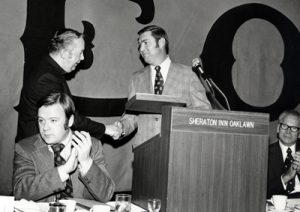 never an abundance of anything but we didn’t want for anything.”
never an abundance of anything but we didn’t want for anything.”
Self-determined
Growing up, Mr. Sigel led a recognizable existence of school, church, family and a close network of friends that played sandlot ball and made some extra money on the side by caddying on weekends. Mr. Sigel entered Leo in the fall of 1949, a thin, wiry and tenacious freshman standing, he recalls, some five-feet, seven-inches and weighing maybe one hundred and ten or so pounds. With his best friend from the neighborhood, Bob Jaeger, the two made the jaunt every day from 111th and Western to Leo’s campus at 79th and Sangamon that required them to take two different streetcars. (By the time of his senior year, the city finally debuted a Western bus line that went from 111th to 79th.)
In 1949, Leo’s tuition was twelve dollars a month, a fee that Mr. Sigel paid out of his own pocket. He was resourceful and self-reliant. “I worked between caddying and when I was old enough, I think sixteen, probably the end of my sophomore year, I went to work for Hi-Lo, the food chain. I was a stock boy. The store I worked at was at 110th and Western Avenue. The [chain of stores] were all over the city, a forerunner to Jewel and Domicks.” The only downside to his independence was the need to work deprived him parallel opportunities to develop his skills and abilities as an athlete. Sports were how a great many young men defined themselves, the source of pride and confidence.
Even so, Mr. Sigel certainly threw himself into the challenge. “I don’t think I was ever a first-stringer but I probably would have made all the teams. I did go out for football. I was getting my head knocked off, but I did go out. With basketball, I was five-feet, seven [inches] or so when I hit Leo, and I was good at basketball. They had a lightweight [for players five-feet, eight-inches and smaller] and they had a team called the Midgets, the underclass team.
“I went out for the Midgets. I wasn’t going to be a starter, but we had some really good lightweight basketball teams. I didn’t see myself excelling with my group.” A formal career in sports was over, except for his involvement in intramural play. (Mr. Sigel never lost his competitive instinct or urge, and he played sandlot baseball, softball and pick up basketball well into his twenties.)
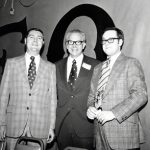 He remained dedicated to the school, and avidly followed how the different teams did. “I never missed a Leo sporting event. The North Side to people like me was so foreign, you might as well have said [some place in] Wisconsin. Once I got north of 79th Street, maybe at the outside of 63rd, that was like Riverview. I’d get sick because of this motion sickness. I hated going north of 63rd. I would go to a sporting events, at Loyola Academy, St. George, I’d go to Fenwick (in Oak Park). By the time we were driving, or I could get a ride. We went to basketball and football games. It was like the Marines, an esprit de corps. I met very nice friends that I still have today.
He remained dedicated to the school, and avidly followed how the different teams did. “I never missed a Leo sporting event. The North Side to people like me was so foreign, you might as well have said [some place in] Wisconsin. Once I got north of 79th Street, maybe at the outside of 63rd, that was like Riverview. I’d get sick because of this motion sickness. I hated going north of 63rd. I would go to a sporting events, at Loyola Academy, St. George, I’d go to Fenwick (in Oak Park). By the time we were driving, or I could get a ride. We went to basketball and football games. It was like the Marines, an esprit de corps. I met very nice friends that I still have today.
“My best friends were still my neighborhood friends from grammar school. I had four or five Leo guys that we’d go to Sabina with on Sunday nights to the dances. I went with my Catejan friends, who were from Ignatius and Carmel. We all got to know each other. I belonged to a club called the Spartans. We had green jackets. We threw a neighborhood party and a lot of guys from Leo would come. We didn’t have dates, but we invited a lot of girls from Longwood, Mercy, and a lot of my Leo friends would come. We probably had 15 guys from Leo come. We had the party in a basement at a church called St. John Fisher. That was a big night.
The Brothers
Any school marked its own fierce adjustment period. Leo was no different, said Mr. Sigel. By the time he entered Leo in 1949, the school had been in existence for less than twenty-five years. The Irish Christian Brothers laid down the law, and it was not exactly a day at the beach. “It was a new experience, certainly a little intimidating when I first got there. It was a little strange [going to an] all-boys. I went with two other friends of mine from Saint Catejan.
“I can’t think of anything unpleasant. Everybody seemed to be in the same boat. I had never had male teachers before I got to Leo. I always had nuns, or a few women lay teachers. The Brothers could be fairly intimidating. Most of them had an Irish brogue, and they were kind of tough characters. They laid the law down on the first day. You pretty much knew the class clowns were not going to win. They were not going to survive. I met some very fine men, also, who were really outstanding, nice gentlemen. And you also met the tough guys,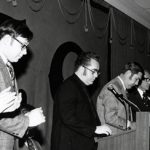 they meant to be tough and they were tough. They probably frightened you into learning as opposed to your desire to love to learn.
they meant to be tough and they were tough. They probably frightened you into learning as opposed to your desire to love to learn.
“I came from an era when the lay teachers that were at Leo were World War II guys who were going to college on the GI Bill. A lot of these teachers were getting advanced degrees and they moved onto the public schools after they got their masters. A lot of those guys were hardworking guys who were staying up late at night, studying and working, and going to school, family men, and we had a lot of respect for them. They were good men and pretty good teachers. Most of the Brothers, some of them were strange. You’d wonder sometimes, ‘Who’d want to do this all the time with their life?’ But they were dedicated and good men.”
Mr. Sigel had his strengths in the classroom (and weaknesses). He was very strong at English and history; he hated math and science and tried hard but did not always fare to his advantage. In the most humiliating experience of his time at Leo, he failed physics as a junior, necessitating he take a summer school course. “It was devastating because I had a really good job in the summer, working for Cook County, going around cutting grass at different facilities, and [summer school] interrupted that. I had to leave that job, and it was a good money job. It took a lot of politics to get that job, and I had to blow it off.” It imparted another lesson about the Brothers. Mr. Sigel’s class grade was right at the borderline, but they were not going to let it pass. And there was decidedly no appeal.
The Depression and World War II were now firmly in the past, but the Cold War was an everyday fact of life. America was no longer an isolationist, developing power but the leader of the western, capitalist free world. In June 1950 North Korea crossed the 25th parallel and invaded South Korea. President Harry Truman responded with a massive American-led United Nations-backed counteroffensive. The war raged for three years, the first two particularly harsh campaigns proved a harsh reminder of the outside world to Mr. Sigel and his friends.
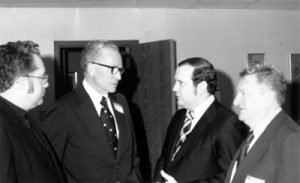 “I was in high school during the heavy part of Korea,” Mr. Sigel said. “I had a neighbor, a guy from De La Salle, four doors down from us, and he was killed in Korea. There was another great guy from Mount Carmel, he graduated from West Point and became a pilot. He died during Korea, and he was sort of an icon of the neighborhood. I remember he was a big, good-looking guy. It hit quite close to home. You knew you had to go, and I intended to go to college. But I also knew when I got out, I had a military obligation; it was universal service.”
“I was in high school during the heavy part of Korea,” Mr. Sigel said. “I had a neighbor, a guy from De La Salle, four doors down from us, and he was killed in Korea. There was another great guy from Mount Carmel, he graduated from West Point and became a pilot. He died during Korea, and he was sort of an icon of the neighborhood. I remember he was a big, good-looking guy. It hit quite close to home. You knew you had to go, and I intended to go to college. But I also knew when I got out, I had a military obligation; it was universal service.”
By the time of his graduation from Leo, Mr. Sigel knew college was the next stage. He just did not know precisely where. Money was an issue, and his parents informed Mr. Sigel they preferred he go to a local school. His first choice was St. Joseph’s College in Rensselaer, Indiana because three of his friends were set to attend school there. “I couldn’t muster up the dough, and I ended up going my freshman year to the University of Illinois at Navy Pier.”
Experiment
“My best friend, Bob Jaeger, he was also from 1953 class at Leo. He was accepted to General Motors Institute (GMI). He was a whiz at math and science, but not at English and things that he didn’t like, like history. But he was good at everything else. It was a co-opt program. The school was owned and operated by General Motors Corporation. As a sophomore, I was able to get into GMI. They had a business program. It was an engineering school, mechanical engineering and industrial engineering, ‘ME,’ and ‘IE,’ in my era. They were bringing out a lot of people great with slide rules, but they didn’t have any business subjects.
So we were kind of an experiment.”
Mr. Sigel had a co-opt arrangement with Buick’s Motor Division. He alternated eight weeks of school with eight weeks of work. He returned home, where he spent time learning the business at the Buick zone at 820 N. Michigan Ave. The experiment worked. He graduated from the school in three years in 1957.
business at the Buick zone at 820 N. Michigan Ave. The experiment worked. He graduated from the school in three years in 1957.
In the interim, he met the most important of his life. One of six daughters, Mary Anne Andrick was an East side girl who went to a Public school, Hirsch. Mr. Sigel saw her through a work connection and was intrigued. At Christmas 1955, he returned home for the holidays. “I had seen her and she was very attractive. Her brother-in-law was an assistant manager at Hi-Lo Foods, where I worked part-time when I was at Leo. I stopped at Hi-Lo to say say hello. His name was Wally Gibbons, also a Leo man from 1945. I started talking to Wally and I asked him if [Mary Anne] had a date on New Year’s Eve. That was the start of a great relationship. We went out for four years, and we got married in 1959.”
The couple marks their fiftieth anniversary this fall. They have five children, four sons and a daughter, eleven grandchildren and one great-grandchild.
Career decisions
“I graduated from GMI in 1957. About ninety percent of the graduates worked for the [GM] corporation. Travel was going to be a big thing as part of a sales, service or parts representative for Buick Motor Division. You didn’t start out in Chicago, New York or Los Angeles. There were twelve zones and subzones. It looked like I was going to Seattle or Portland.”
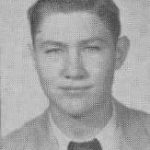 He was engaged, and he also had his army obligation. He had two choices, either a two-year service with a four-year reserves commitment or a sixth-month active duty and five and a half years of reserves. He elected to go with the shorter active duty responsibility. Hostilities in Korea ended in 1953. It was, he says fortunately, peace time by then. He did his sixth month army stint, serving in Missouri and Colorado. Having discussed it with his fiancé, Mr. Sigel decided they did not want to relocate to the Pacific Northwest.
He was engaged, and he also had his army obligation. He had two choices, either a two-year service with a four-year reserves commitment or a sixth-month active duty and five and a half years of reserves. He elected to go with the shorter active duty responsibility. Hostilities in Korea ended in 1953. It was, he says fortunately, peace time by then. He did his sixth month army stint, serving in Missouri and Colorado. Having discussed it with his fiancé, Mr. Sigel decided they did not want to relocate to the Pacific Northwest.
His path took him to the business side of journalism. He went to work at the city’s largest daily newspaper, the Chicago Tribune. “I started out in advertising and transportation, with the background I had in automotives. Classified advertising of automobiles, and then I got into transportation, trucking, then I went to circulation and transportation. Then I was in circulation sales. I was on the monthly pay roll, and there were only forty of us in the company. I was a high roller.
Alas, it did not last. The Tribune became a public traded company in 1973 that cleared the path of its corporate shift that accelerated the wholesale departure of Mr. Sigel’s department. He was one of a group of people who lost their jobs. “They brought in management for the first time, a lot of changes, and I was fired from the Chicago Tribune in 1973. I had thirteen years. It was a devastating thing that happened. It was probably the first devastating thing of my life.”
Mr. Sigel rebounded quickly and had another job in two weeks. He spent four years as general partner of the Airport Bus Company, directing a company’s fleet of 40 limousines. “I always had a fancy company car, but I didn’t think I was making as much money as I wanted, so I moved into the trade association business.”
It was a throwback that took advantage of his experience in the automobile service industry with marketing and promotion. “I was in two automotive trade associations, one serving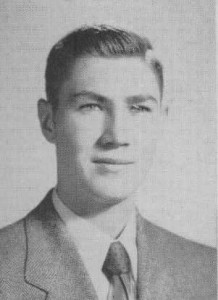 the service segment and the other the parts.” The automotive aftermarket deals with the manufacturing, remanufacturing, distribution, retailing, and installation of all vehicle parts, chemicals, tools, equipment and accessories for light and heavy vehicles, after the sale of the automobile by manufacturer to the buyer.
the service segment and the other the parts.” The automotive aftermarket deals with the manufacturing, remanufacturing, distribution, retailing, and installation of all vehicle parts, chemicals, tools, equipment and accessories for light and heavy vehicles, after the sale of the automobile by manufacturer to the buyer.
“We ran shows for the aftermarket in Las Vegas and the McCormick Place. We represented I’d say ninety percent of the aftermarket. Our shows drew about 100,000, people from all over the world. It was the second largest show at McCormick Place for years. I had a very nice career.”
Leo alumni association
In the late 1960s, Mr. Sigel had a chance encounter with a Leo classmate who told him about the Leo alumni association. The group held elections for its association officers in Oak Lawn, where rather conveniently Mr. Sigel was living with his family. He attended his first alumni meeting, and he was promptly hooked. In the roughly forty years since his original involvement, Mr. Sigel has played an integral role in association’s operation. He was the Alumni Association president in 1974 and 1975. He is credited with an invaluable organization role in computerizing the association’s records.
He played a decisive role in securing the participation of one of the school’s most prestigious graduates. “One day, while I was president of the association, I read a story in the business section of [Chicago] Daily News that Thomas A. Murphy was going to give a speech in downtown Chicago to one of the business associations. He was a graduate of Leo and was now the chairman of General Motors. I never heard of him. Nobody I knew ever mentioned him.
“I wrote him a letter. ‘Dear Mr. Murphy, I’m the president of Leo Alumni Association, and we’d like to invite you to be the man of the year in 1975.’ My wife typed the letter. I wasn’t even sure we’d get a reply. I had five children, and they were all little at the time. At the dinner table, one of the kids says, ‘A guy named Tom Murphy called you.’ I’m thinking it was some guy selling me insurance. I didn’t pay much attention. About seven o’clock, I get a call, ‘I’m Tom Murphy from General Motors. I’ve been away from Leo for too long. I graduated from Illinois, and after that, all of my ties to Illinois and Leo ceased because I moved East. I’d be delighted. I’ll give you my private number.’
“The one thing he said he wanted was a yearbook from 1932. We were able to get one. Murphy came and did a fantastic job. We had the banquet at the Sheraton in Oak Lawn in April 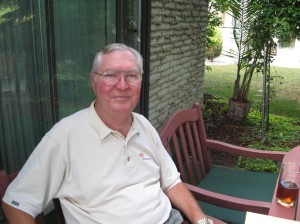 1975. We had a private cocktail party on the top floor. We had Cardinal Cody and quite a few dignitaries who came.
1975. We had a private cocktail party on the top floor. We had Cardinal Cody and quite a few dignitaries who came.
“We got the names of all the car dealers. We had a heck of a book with car dealer ads. That was a great coup to get Murphy. Murphy donated one school bus. He made it clear it was not from GM, it was from Mr. and Mrs. Thomas Murphy. It was one of the first school buses Leo ever had. That was quite a coup and that was my claim to fame.”
Mr. Sigel is a member of the Leo Hall of Fame and is a past recipient of the Alumni Man of the Year. He and his wife live in Palos Heights. He still works part-time in the car service business.
“I got a good foundation at Leo for studying, even though some of it had to be beaten into me. The Brothers motivated you. Today kids have these school trips to all over the world practically, Washington, Hawaii, even Paris. The Leo senior trip was to Statesville Penitentiary in Joliet. There were three busloads and we spent the day at Statesville. We toured and saw everything, saw how the inmates lived. We played two baseball games. One was twelve-inch that you played with gloves and the other was sixteen-inch, the kind of balloon ball. They beat something horribly with the twelve-inch, but we reversed it with the bigger ball. The subliminal message that I got was that I never wanted to come back here to visit or to ever live here.
That was our senior trip.”
Interesting life hope it persists